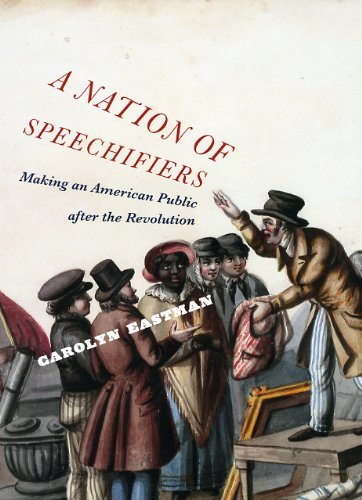Carolyn Eastman is Professor of History at Virginia Commonwealth University.
During the 2021-2022 academic year, she was in residence as a National Endowment for the Humanities (NEH) fellow at the New-York Historical Society, developing a new book on New Yorkers’ experiences of the yellow fever epidemics in the 1790s. She continued that work in 2022-2023 as a Public Scholar funded by the NEH.
She writes about early America and the Atlantic world, focusing on the intersections of gender, political culture, and the mediums of writing, speaking, and visual images. Those pieces have appeared in popular venues like Slate, the Gotham Blog, and Smithsonian, and in academic journals such as Gender & History, the William and Mary Quarterly, and American Nineteenth Century History.
She is the author of two books:
The Strange Genius of Mr. O

Winner of the 2022 Library of Virginia Literary Award for Nonfiction
Winner of the 2022 SHEAR James Bradford Best Biography Prize
When James Ogilvie arrived in America in 1793, he was a deeply ambitious but impoverished teacher. By the time he returned to Britain in 1817, he had become a bona fide celebrity known as Mr. O., counting the nation’s leading politicians and intellectuals among his admirers. And then, like so many meteoric American luminaries afterward, he fell from grace.
The Strange Genius of Mr. O is at once the biography of a remarkable performer — a gaunt Scottish orator who appeared in a toga — and a story of the United States during the founding era. Ogilvie’s career featured many of the hallmarks of celebrity we recognize from later eras: glamorous friends, eccentric clothing, scandalous religious views, narcissism, and even an alarming drug habit. Yet he captivated audiences with his eloquence and inaugurated a golden age of American oratory. Examining his roller-coaster career and the Americans who admired (or hated) him, this book renders a vivid portrait of the United States in the midst of invention.
“Who was James Ogilvie? In a page-turning book that reads more like a mystery novel than the work of a professional historian, Carolyn Eastman reconstructs not just a forgotten life of celebrity but a forgotten world of the early United States. Through her artful telling, we learn how a young public’s earnest desire for self-improvement combined with a singular man’s oratorical genius and media talent to fuse education, religion, politics, and hucksterism into an indistinguishable cultural brew. With a keen eye — and with great wit and archness — Eastman pulls these and other strands apart even as she shows their impossible interconnections in American culture. It is a rare work of history that speaks to both past and present.” –François Furstenberg, Johns Hopkins University
Buy it at UNCPress.org / at Bookshop.org / at Amazon.com
A Nation of Speechifiers

Winner of the 2010 SHEAR James Broussard Best First Book Prize
Finalist for the Best Book Prize from the Berkshire Conference of Women Historians
In the decades after the American Revolution, inhabitants of the United States began to shape a new national identity. Telling the story of this messy yet formative process, A Nation of Speechifiers: Making an American Public After the Revolution argues that non-elite men and women gave meaning to American nationhood and national belonging by first learning to imagine themselves as members of a shared public.
The creation of this American public — which only gradually developed nationalistic qualities — took place as women and men engaged with oratory and print media not only as readers and listeners but also as writers and speakers. These media were so important because they provided unparalleled means of modeling exemplary public interaction. This book paints vibrant portraits of the arenas where these engagements played out, from the schools that instructed children in elocution to the debating societies, newspapers, and presses through which different groups jostled to define themselves, sometimes against each other.
“This is a major contribution to scholarship on the early republic. Scholars in a wide range of fields will learn from it and consult it constantly.” — Sandra Gustafson, University of Notre Dame
Buy it at University of Chicago Press / at Bookshop.org / at Amazon.com